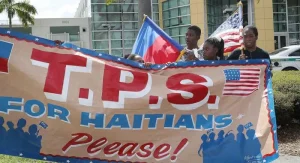With TPS for Haitian nationals at risk of expiring, Massachusetts Attorney General Andrea Joy Campbell is stepping up decisive legal action to defend this crucial protection for immigrant families.
Campbell, who leads a state with the third-largest Haitian community in the U.S., joined a coalition of sixteen attorneys general. Together, they support preserving TPS for Haitian and Venezuelan nationals before the U.S. Court of Appeals for the Ninth Circuit.
In an amicus curiae brief filed with the appellate court, the coalition urges judges to uphold a federal district court decision in California that found the Trump administration’s attempt to terminate TPS for Haitians and Venezuelans unlawful.
According to the attorney general’s office, this effort to eliminate protections targets people “who have lived, worked, and raised their families in the United States for years.”
The attorneys general say this happens “despite ongoing humanitarian crises in Haiti and Venezuela and warnings from the U.S. Department of State regarding safety.” They note the Trump administration tried to end TPS “even after the previous administration acknowledged these crises and extended protections.”
Attorney General Campbell and her counterparts warn that revoking TPS would have devastating consequences for immigrant families, communities, and the state.
The brief emphasizes that the district court found the administration’s decision to be “arbitrary, capricious, and contrary to law.” It states that ending legal status would create chaos for hundreds of thousands who fled violence and poverty to build lives in the U.S. Without TPS, these immigrants would lose work authorization and face deportation, “endangering themselves and their families.”
The coalition emphasizes the scale of families directly affected
In 2022, approximately 54,000 U.S. citizen children and 80,000 U.S. citizen adults lived with a Haitian TPS holder, while 87,000 children and 116,000 U.S. citizen adults cohabited with a Venezuelan TPS holder. If the government succeeded in revoking TPS, the attorneys general warn, “parents would face an impossible choice: return to their birth country, leaving families behind, take U.S. citizen children to a dangerous country they do not know, or remain in the United States without legal status, living in perpetual fear of deportation.”
Beyond the human toll, the coalition emphasizes the major economic and social impact of revocation.
The brief notes that Venezuelan TPS holders contribute over $11 billion yearly to the economy. Haitian TPS holders add $4.4 billion. In 2022, 69% of Haitian immigrants aged 16 and older were employed, particularly in the healthcare and service industries, which were facing shortages. An estimate suggests that approximately 75,000 Haitian TPS-eligible workers are employed in critical sectors.
Campbell emphasizes the vital role Haitians play in the state of Massachusetts
Massachusetts has over 15,000 Haitian TPS holders, including many working for the Department of Developmental Services, which serves people with disabilities. According to the statement, these workers care for vulnerable residents. Losing their legal status and work authorization “would cause irreparable harm to families, workforces, and state economies.”
The attorneys general also highlight public health risks. Revoking TPS for these communities would leave many people without work authorization, “compromising their ability to support their families.” By extension, employer-provided health insurance on which these families depend would be threatened, “posing significant risks to public health.”
For Campbell, this new action is part of a long-term strategy to counter repeated attempts by the Trump administration to dismantle TPS.
In March, the Massachusetts attorney general co-led a coalition of nineteen state attorneys general in filing an amicus brief with the federal district court in Massachusetts, alongside the organization Haitian-Americans United, to challenge early terminations of TPS for Haitians and Venezuelans. In September, she again co-led a coalition of eighteen state attorneys general in the case Miot, et al. v. Trump, et al., aimed at blocking the Trump administration’s attempt to end Haiti’s TPS designation and revoke immigration legal status from hundreds of thousands of Haitians living and working in the United States.
This mobilization is especially significant in Massachusetts, home to the nation’s third-largest Haitian community. In Boston, Brockton, Randolph, Somerville, and Malden, TPS holders work in hospitals, nursing homes, schools, personal services, transportation, and the hospitality industry. For them, ending TPS would be more than an administrative change—it would be a brutal disruption to daily life and family stability.
By joining this coalition, alongside states such as California, New York, New Jersey, Maryland, Minnesota, and Oregon, Massachusetts aims to influence the broader debate.
The attorneys general ask the court to confirm that the Trump administration’s attempt to end TPS violates federal law and ignores the humanitarian, economic, and social situation of Haitian and Venezuelan immigrants.
As the TPS deadline for Haitians approaches, the outcome of this legal battle will be closely watched by thousands of families who have settled in the United States for years.
Attorney General Campbell and her peers underscore: TPS is essential to safeguard human rights, economic security, and social stability in Massachusetts.

Note: This article is a translation from French. Direct quotations may differ slightly from the original English statements available on the Massachusetts Attorney General’s website.







